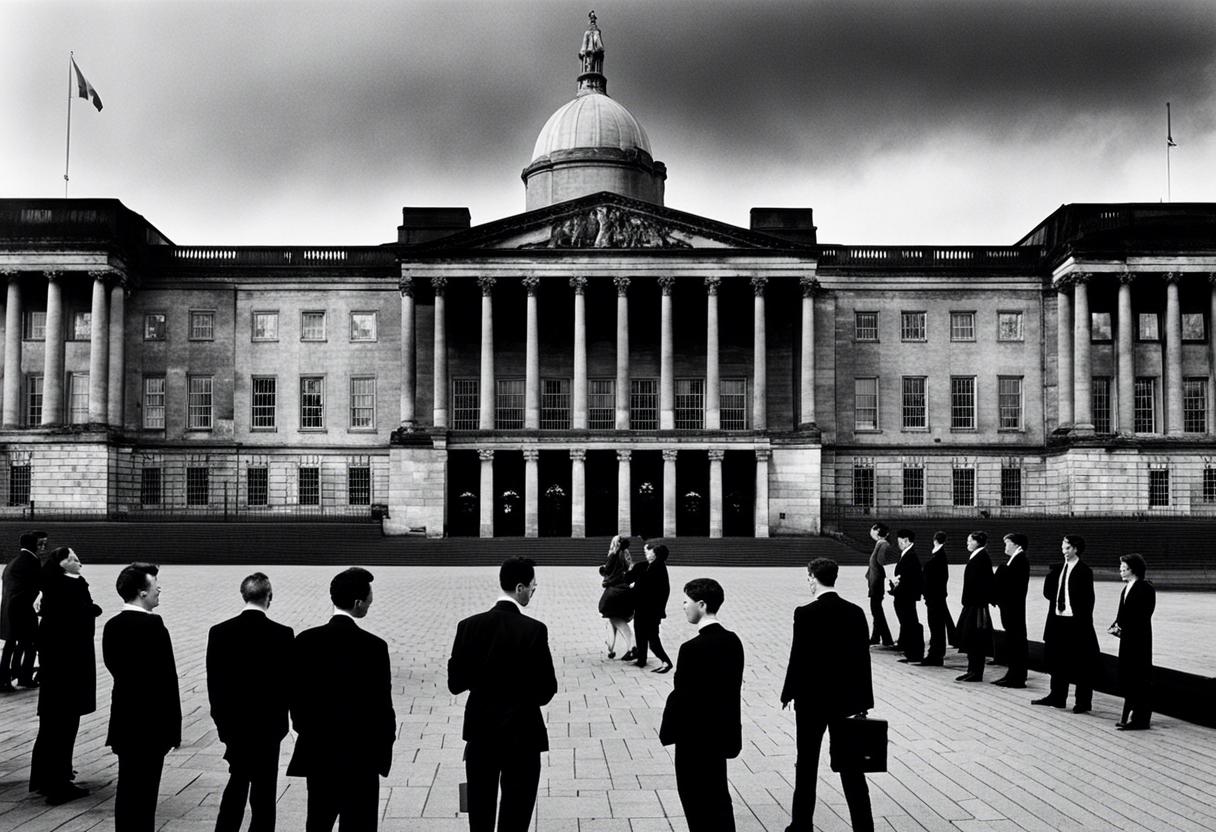Reflect on the present display of electoral politics in America. The standing president, aged 81, is the most senior individual to ever hold this position. His rival, who at the age of 78 has also served in this role, would also become the eldest president in history if victorious. This presents quite a disheartening image, significantly magnified by the president’s obvious physical and cognitive deterioration. Regardless of the outcome, the position often referred to as the “leader of the free world” will inevitably belong to a man breaking records of seniority.
If this situation were a work of fiction, which it sadly is not, as a literary critic I would be compelled to mention that this is undeniably blatant. Couldn’t the author have used subtler allegory to reflect an empire on the verge of collapse? Moreover, while I do appreciate a reference to the King James Bible, associating the name ‘Trump’ with the opposition (“We shall all be changed in a moment, in a twinkling of an eye, at the last trump”) seems to exaggerate the apocalyptic undertone.
The prevailing sentiment in our time is one of melancholic helplessness. We are confronted with a crisis of climate change that’s colossal and severe. Capitalism, continually touted as the only viable system, appears unable to do anything but plunge us deeper into this crisis. Far-right ideologies are spreading across Europe and America, effectively using their usual tactics. This familiar game of misdirection redirects societal anger, borne from conditions favouring the elite, towards immigrants and outsiders. The sense of a decaying civilisation, marked by ageing demographics and diminished future prospects for the youth, is made more disheartening by the elderly at the helm, offering no change but a continuation of the status quo, with increasingly less to offer.
Apparently, Ireland is treading a different path from the usual narrative of decline that comes with age-centric leadership. A few months ago, Simon Harris, at age 37, became the youngest Taoiseach in the history of the country to assume office. His immediate predecessor, Leo Varadkar, held the record before him, having become Taoiseach at age 38. Further reinforcing this pattern, this week saw the 33-year-old Jack Chambers sworn in as the youngest Finance Minister since the days of Michael Collins.
Isn’t this a positive trend, an indicator that we’re moving in the right direction?
However, if you’re a regular reader of this column – like Chambers, it hasn’t been long since it’s been established but somehow still feels impossibly seasoned – you’d know that contentment eludes me, especially when the reverse of a situation I’ve been lamenting on occurs.
Let’s explore the personal implications – the reality of the Taoiseach being younger than me somehow makes a dent in my self-perception. What my self-perception entails, I’m uncertain, except for the fact that it’s irrevocably tied to the concept of being the junior of the incumbent Taoiseach. My near miss with Varadkar, who is just slightly older than me, left room for convincing myself that his relative youth was an anomaly, and I had at least one more term before coming to terms with a Taoiseach younger than me. However, with Harris’s rise to the top, this has become my personal debacle.
In a rather disconcerting revelation, it came to my attention just a day ago that Roderic O’Gorman, who is a primary contender for the next Green Party leadership, is also younger than I am. As for his primary competition, Pippa Hackett, my knowledge of her is limited, but I am in full support of her mission to attain the leadership role primarily because, a) there is a strong need for increased female representation in our political landscape, and b) I am not particularly keen on having political leaders who were born post-1980. Should O’Gorman secure this role, and theoretically if Chambers, recently pronounced as the deputy leader of Fianna Fáil, succeeds Micheál Martin as party head, before the next voting session, all three Coalition leaders will not merely be male but also younger than me. This situation presents an essential need for the voters to refrain from reinstating the current ruling party to power.
I would concede that the ruling parties likely do not intentionally favour extraordinarily young candidates for senior roles, this can inadvertently serve as a reminder of my own progression in years – an inescapable fact of life, as it is. There is presumably another motivation. My interpretation is that this could be associated with a desire to deter any suggestions that the political setup is gradually becoming redundant with age. What more appropriate strategy to exemplify a government’s dynamism and energy, than appointing a 33-year-old as the Finance Minister? While it’s true that Chambers may have been groomed from an early age in an Ógra Fianna Fáil incubation setting, he was still in diapers when Bertie Ahern was receiving monetary gifts from friends.
The illusion of youth in Ireland’s political scene is markedly less disheartening than the symbolic display of imperial decay in America. It does, however, show an establishment desperately striving to portray relevance and energy. Despite his noticeable youth, our freshly appointed finance minister is more of a symbol of stagnation and possibly decline than progress. As a 27-year-old legislator in 2018, he was openly campaigning for a no vote in the Repeal referendum. He signifies a politics that has been failing us for a considerable period and belongs in bygone times.
Bear in mind that the most cherished and enduringly forward-thinking key individual in Irish politics is our President. Despite being 83, he’s older than both Biden and Trump. This clearly shows that the symbolic correlation between youth and progress, and age and regression doesn’t hold true.

